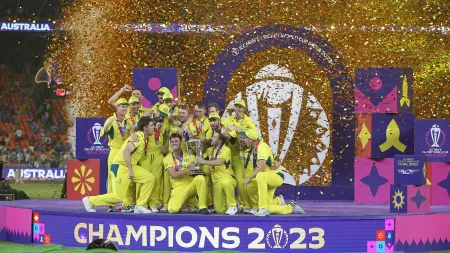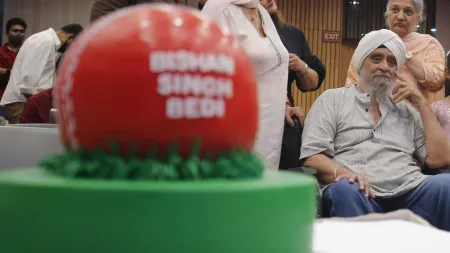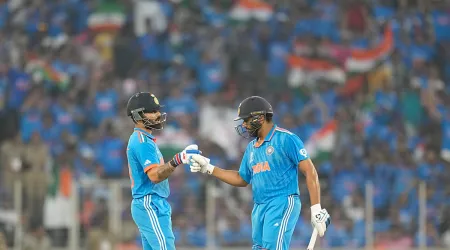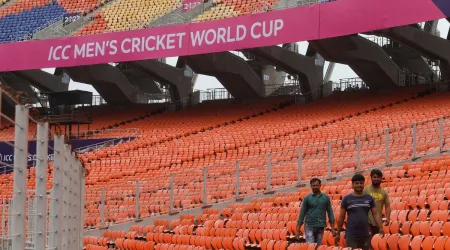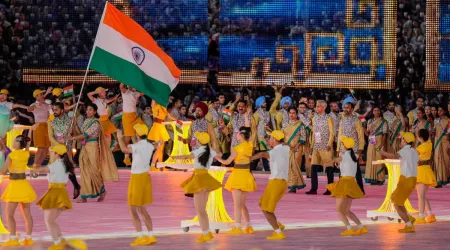- India
- International
It’s not the Olympics, but plenty at stake
CWG may lack the appeal of Olympics but there is plenty on stake — for nations, athletes.
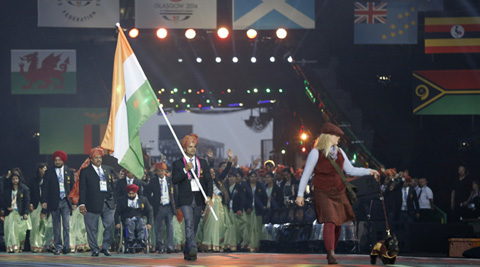 Vijay Kumar leads the Indian contingent during the opening ceremony of the 2014 Commonwealth Games in Glasgow (Source: AP)
Vijay Kumar leads the Indian contingent during the opening ceremony of the 2014 Commonwealth Games in Glasgow (Source: AP)
In the pub-crawl of international sports, played to the latino of Brazil’s World Cup and jazz of Wimbledon, the country airs of Tour de France and the blues of Chisora refusing to fight Fury, the metal of Rory’s triumph at the Open and finally the bhangra-rap of India’s Test win over England, Scotland will try to line up men wearing skirts who will proficiently play the hauntingly brilliant laments of the bagpipe at the Commonwealth Games starting Wednesday.
Athletes, not quite kilted – more kitted out, will try following the pipe-majors. Sure English have ripped apart the Scottish opening ceremony wear in their tabloids, and Australia’s woken up to find little apple-islanders Tasmania missing from its Speedo suits. But historical excuses to snipe at each other can only go so far within this community of Commonwealth nations.
So it’s all settled by playing sport.
It’s simplistic to say that the tenuous imperial links that the British (name dropped in 1978) Empire (name slashed in 1970) had with its erstwhile territories have frayed so much, that the Commonwealth Games are completely redundant.
Even allowing for lawn bowls and the queen’s baton relay, the Games were the talk of town in the Indian capital four years ago, where, as generous hosts we served the travelling contingents a hundred different cuisines and offered athletes shampoo top-ups in bathrooms – one for each visitor.
Mercifully, India also made the most of its own lavish party by finishing second on the medal’s table

So why blame the Scots who are looking to scale two peaks (they call it Munro bagging here) in two months — host the best party possible at the Games in the coming dozen days, and then try and rid themselves of the overlordship of England in a Yes/No referendum mid-September, where they can chuck out a three-century long baggage, like bins emptied of liquor bottles, the morning after.
Why grudge the Scots the right to feel punch pleased about themselves after they’ve goaded Usain Bolt to step out of his lush London apartment and run a sprint relay, in what is frankly a 9-second-or-less of exhibition.
They don’t see it that way here, of how this assembly of athletes — who assuredly speak English or know someone who definitely does — is wasting its collective time at a Games, that are battling for relevance.
Sir Chris Hoy, legend on the bike, is a Scot and obliged to make an impassioned plea for the Games to be taken seriously. But you sense that he believes in what he’s saying when he says, “Athletes can still become legends and household names after a goodCommonwealth haul. They’ve played a big part in giving me experience to go onto the Olympics and win there,” he says in his deep voice.
For swimmer Michael Jamieson, a Glasgow boy and Olympic silver medallist in 200m, it is about getting the host nation its first gold of the Games at a pool where he grew up.
The Australians have fallen back on the old whipping boys, the English, as their pool-pipers Alicia Coutts, James Magnussen, ChristianSprenger and Lorna Tonks go about strutting their stuff, and the rest of the sportsmen go head-to-head against the Ashes rivals.
If nothing else, this ‘Commonwealth’ can be held together by the common theme of how everyone can find enough reasons to diss the English.
There’s also Mick Gauld — an English pistol shooter, a grandfather, who also doesn’t like his fellow English who denied him a place at the London Olympics. He’s chasing Philip Adams’ 18 medals to become the all-time highest. But there’s enough athletes around, like Roland Schoeman of South Africa, who consider the Games a tradition, a why-not, a chance to contribute to the nation’s tally.
Bolt’s treating this like a guest appearance, but for the likes of David Rudisha, Sally Pearson, Mo Farah, it is London Games Lite two years after their biggest triumphs. There’s the fresh burst of Kenyan Eunice Sum, currently dominating 800m and Canadian Derek Drouin hop-scotching over 2.40m, and the long legacy of Valerie Adams, the Kiwi shotputter who’s unbeaten for years. The Games will always find meaning for those without other preoccupations on their minds — as a tune-up for the next big Olympics.
Southern hemisphere’s small top-dogs New Zealand have rugby and netball crowns to defend, and for perennial Olympic hopefuls squash with its agreeable poster-children Nicol David and Nick Matthew, CWG is as big as it can get, given wrestling edged them out.
The one-sidedness and dominance of certain contests — even if India rake them in in badminton and shooting — can be a little off-putting, but rivalries get made as you go along, and secretly even Glasgow is itching to show Edinburgh (it’s like a Mumbai-Delhi scoff-off) that Scotland can erase the disastrous memories of Edinburgh 1986, which was racked by boycotts.
India’s come a long way since they snubbed the Empire in the 1930s and turned on their heels setting off for the South East Asian Games instead. Even in 2014, the Asiad makes more sense — as do the World Championships in badminton and shooting and the Olympic qualification in hockey at Incheon — rather than this Glasgow gallivant.
But then again, the sweetest feeling as Indians who edged out England at Delhi would know, is pipping the Auld Enemy. Within the Commonwealth, enemies can be made and unmade as you go along. In Scotland, you’ll also find a piper at hand, to raise the shrilly pitch of the battle cry.




















